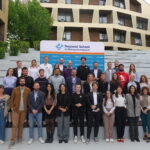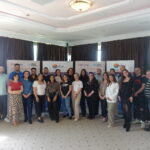Western Balkans (the term we accept as a political construct) is not a “powder keg” waiting to explode. That would be a dangerous simplification, or “spin”. It was (and remains) a fantastic part of the world, unique in the multitude of different identities that compose it, deposited in layers that extend deep and are located far away from the attention of political elites, or “mainstream” media. This is a part of the world where many are fighting, struggling for a decent life; trying to leave their mark, or something behind. It is also part of the world where many are in despair, or want to leave (it) for good due to lack of perspective. And, it is tormented by legacy of conflict being repeated, becoming part of collective identity and memory in each and every society. Today, when one wants to paint the picture black, it suffices if he or she says how memory of war is the only thing that prevents “us” from repeating it. All in all, the Western Balkans feels like dozens of other regions in the world, just that it is more important to us.
Serbia is located in the center of Balkans. It is a given, simple geography. However, to devote oneself to the Western Balkans is something else and that is what’s missing. The reason lies not only in the proverbial lack of (political, administrative) capacity (which plagues all countries in the region); but lack of political courage before anything else.
Serbia needs to define a new policy towards and within the region. It should not be that empty story of leadership; but real commitment and results.
This country should do this because it is in its most immediate interest. It – its elites – are responsible to citizens to do so, since citizens rightly expect that the elites (“those in power”) look and see further than they do.
In doing so, the general disposition of Serbia must be positive. Its Government must insist on cooperation and exchange. Promote connectivity. Universities should get on board with creating common/shared departments. To encourage the learning of languages, Albanian, Bulgarian, Romanian, not because this is something we like or love, but because we need each other. Talk with European officials, the European Commission and initiate new, innovative forms of financing that will be accessible to local actors more than today. Sift through existing regional initiatives and pick five to six that bring results, but at the same time support them, help them financially. Use the potential of civil society. Invest in the Western Balkans Fund, the way countries of Visegrad did with theirs. Support the Regional Youth Cooperation Office, at this crucial moment for its (future) work. Establish connections between professionals: doctors, engineers, architects. At the macro level one should strive to create a single market and help bring about freedom of movement. This might be the only region in which we are all competitive in terms of price and quality of products. Lastly, this should not be seen as a replacement for the EU, rather a variation of this “multi-speed Europe” coming to life.
This is not a replacement for the EU, but the reality of some variation of “multi-speed Europe”.
What remain are the most difficult questions to which economy can not provide an answer, ones of sovereignty and understanding of history. It is possible that we will never agree on what happened in the 1990’s. Myths have been built, and states on top of them. Coming generations have been educated in a certain way for two decades. However, fear or even hatred still arise from misunderstanding and ignorance. In terms of culture, mentality, this is one region. It is a pity that so few of us have had the opportunity to understand this, through traveling, encounters. On the other hand, there are many of those who do not want to; do not have the experience; do not know the region; but are still loud in claiming how Serbs (or members of their own ethnicity) are threatened everywhere. These have become are our very own “fake news”.
If one can judge by the latest events (elections in Austria, the Netherlands), the European Union will in 2017 come out of its existential crisis. When that happens, the group of countries which are set on closer cooperation, and deeper integration will naturally have a different focus. Will we remain on the periphery, interesting to others just because of our potential for conflict; or become a new engine of development, “the new Visegrad”, depend on us and us alone. No one has the right to a priori say how this is not possible.
Will we remain on the periphery, interesting to others just because of potential for conflict; or one of the engines of development, “the new Visegrad”, depend on us alone.
If in a year or two, if everything remains as it is now, we may write a similar article. Or someone else will do it: the need for a new policy will still be out there.
First published at Novipogledi.rs (in Serbian; translated by the author), 21/03/2017













